初中英语动词时态总复习(超级精华版)
八年级英语 动词时态知识点总结超详细
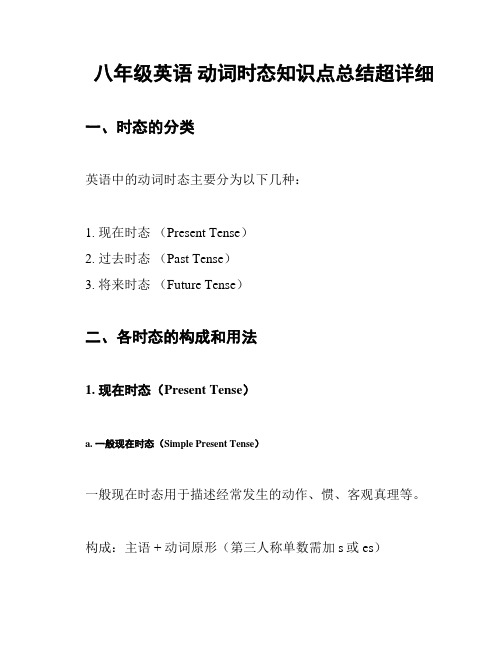
八年级英语动词时态知识点总结超详细一、时态的分类英语中的动词时态主要分为以下几种:1. 现在时态(Present Tense)2. 过去时态(Past Tense)3. 将来时态(Future Tense)二、各时态的构成和用法1. 现在时态(Present Tense)a. 一般现在时态(Simple Present Tense)一般现在时态用于描述经常发生的动作、惯、客观真理等。
构成:主语 + 动词原形(第三人称单数需加s或es)例句:- I play basketball every day.(我每天都打篮球。
)- He eats an apple for breakfast.(他早餐吃一个苹果。
)b. 现在进行时态(Present Continuous Tense)现在进行时态用于描述正在进行的动作或现阶段的临时情况。
构成:主语 + be动词(am/is/are)+ 现在分词例句:- We are studying English now.(我们现在正在学英语。
)- She is reading a book at the moment.(她此刻正在读一本书。
)c. 现在完成时态(Present Perfect Tense)现在完成时态用于描述过去发生的动作对现在产生的影响或结果。
构成:主语 + have/has + 过去分词例句:- I have finished my homework.(我已经完成了我的作业。
)- They have visited China many times.(他们已经多次访问过中国。
)2. 过去时态(Past Tense)a. 一般过去时态(Simple Past Tense)一般过去时态用于描述过去某个特定时间发生的动作或状态。
构成:主语 + 动词过去式例句:- She danced at the party last night.(她昨晚在派对上跳舞了。
初中英语动词八大时态知识点归纳
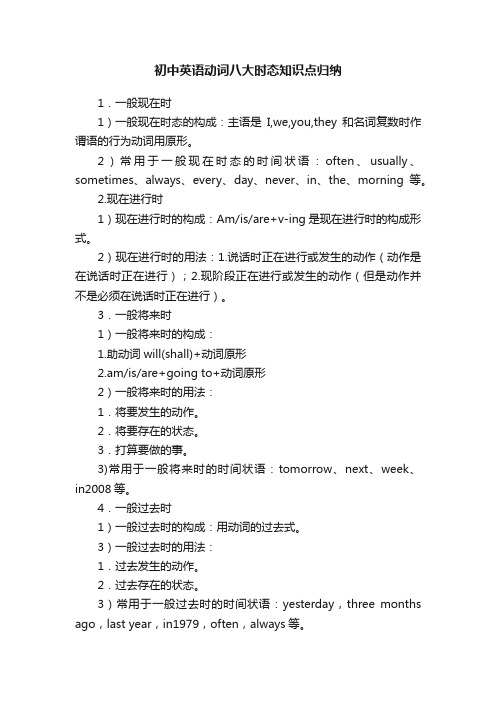
初中英语动词八大时态知识点归纳1.一般现在时1)一般现在时态的构成:主语是I,we,you,they和名词复数时作谓语的行为动词用原形。
2)常用于一般现在时态的时间状语:often、usually、sometimes、always、every、day、never、in、the、morning等。
2.现在进行时1)现在进行时的构成:Am/is/are+v-ing是现在进行时的构成形式。
2)现在进行时的用法:1.说话时正在进行或发生的动作(动作是在说话时正在进行);2.现阶段正在进行或发生的动作(但是动作并不是必须在说话时正在进行)。
3.一般将来时1)一般将来时的构成:1.助动词will(shall)+动词原形2.am/is/are+going to+动词原形2)一般将来时的用法:1.将要发生的动作。
2.将要存在的状态。
3.打算要做的事。
3)常用于一般将来时的时间状语:tomorrow、next、week、in2008等。
4.一般过去时1)一般过去时的构成:用动词的过去式。
3)一般过去时的用法:1.过去发生的动作。
2.过去存在的状态。
3)常用于一般过去时的时间状语:yesterday,three months ago,last year,in1979,often,always等。
5.现在完成时1)现在完成时的构成:have/has+v-ed2)现在完成时的用法:1、表示过去发生的动作对现在造成的影响或结果.常与already,just,ever,never,before等词连用.2、表示“过去的动作”一直延续到现在并有可能继续延续下去.常与for(后跟段时间)或since(后跟点时间)等连用.6、过去进行时1)过去进行时的构成:was/were+v-ing2)过去进行时的用法:过去某一阶段或某一时刻正在进行的动作。
例如:This time last year I was living in Brazil.3)常用于过去进行时的时间状语:at four yesterday afternoon,then,at that time/moment 等。
初中动词时态知识点总结
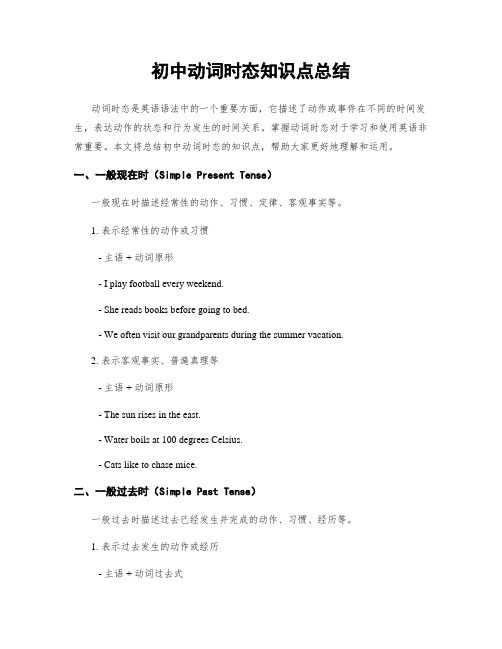
初中动词时态知识点总结动词时态是英语语法中的一个重要方面,它描述了动作或事件在不同的时间发生,表达动作的状态和行为发生的时间关系。
掌握动词时态对于学习和使用英语非常重要。
本文将总结初中动词时态的知识点,帮助大家更好地理解和运用。
一、一般现在时(Simple Present Tense)一般现在时描述经常性的动作、习惯、定律、客观事实等。
1. 表示经常性的动作或习惯- 主语 + 动词原形- I play football every weekend.- She reads books before going to bed.- We often visit our grandparents during the summer vacation.2. 表示客观事实、普遍真理等- 主语 + 动词原形- The sun rises in the east.- Water boils at 100 degrees Celsius.- Cats like to chase mice.二、一般过去时(Simple Past Tense)一般过去时描述过去已经发生并完成的动作、习惯、经历等。
1. 表示过去发生的动作或经历- 主语 + 动词过去式- I watched a movie last night.- She visited her friend yesterday.- We lived in London for five years.2. 表示过去的习惯- 主语 + used to + 动词原形- I used to go swimming every summer.- He used to play basketball when he was young.三、一般将来时(Simple Future Tense)一般将来时描述将来会发生的动作、计划、打算等。
1. 表示将来会发生的动作或计划- 主语 + will + 动词原形- I will visit my grandparents next week.- She will study abroad after finishing high school.- They will have a party for their anniversary.2. 表示意愿、决定和承诺- 主语 + be going to + 动词原形- I am going to start a new job next month.- He is going to learn how to play the guitar.- We are going to travel around the world in the future.四、现在进行时(Present Continuous Tense)现在进行时描述正在进行的动作、当前的情况和变化等。
初中英语时态归纳总结
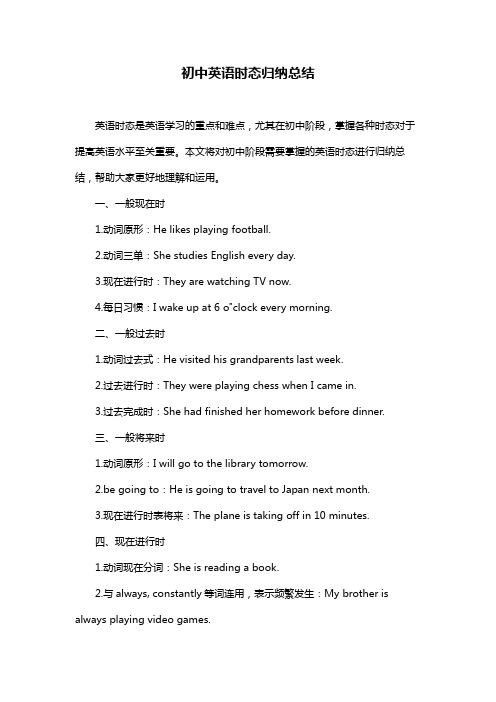
初中英语时态归纳总结英语时态是英语学习的重点和难点,尤其在初中阶段,掌握各种时态对于提高英语水平至关重要。
本文将对初中阶段需要掌握的英语时态进行归纳总结,帮助大家更好地理解和运用。
一、一般现在时1.动词原形:He likes playing football.2.动词三单:She studies English every day.3.现在进行时:They are watching TV now.4.每日习惯:I wake up at 6 o"clock every morning.二、一般过去时1.动词过去式:He visited his grandparents last week.2.过去进行时:They were playing chess when I came in.3.过去完成时:She had finished her homework before dinner.三、一般将来时1.动词原形:I will go to the library tomorrow.2.be going to:He is going to travel to Japan next month.3.现在进行时表将来:The plane is taking off in 10 minutes.四、现在进行时1.动词现在分词:She is reading a book.2.与always, constantly等词连用,表示频繁发生:My brother is always playing video games.五、过去进行时1.动词过去分词:They were discussing the project.2.与at that time, at this moment等词连用,表示在某个时间正在进行的动作:At that time, she was sleeping.六、完成时1.现在完成时:I have finished my homework.2.过去完成时:He had left the classroom before I arrived.七、被动语态1.一般现在时:The book is written by him.2.一般过去时:The window was broken by Tom.3.一般将来时:The letter will be sent to her tomorrow.总结:初中英语时态的学习需要掌握一般现在时、一般过去时、一般将来时、现在进行时、过去进行时、完成时和被动语态等。
最新初中英语语法知识—动词时态的知识点总复习附答案解析

一、选择题1.He to the zoo yesterday.A.goes B.go C.goed D.went 2.—Surprise! Cindy is singing in the concert.—But she ______.A.will refuse B.refusedC.refuses D.has refuse3.We’re not sure _______ there’ll be _______ or not tomorrow.A.if; rains B.if; rainy C.whether; raining D.whether; rain 4.No noise, please. Your brother ________ his homework in the next room.A.does B.is doing C.did D.has done5.— Look at my new watch.—Well, it’s so cool! When and where________you buy it?A.Do B.will C.did D.Are6.It ________ heavily when I left the movie theater.A.rains B.was raining C.is raining D.will rain 7.My mother will be very angry with me when she out where I have been.A.finds B.found C.will find D.has found 8.—I don’t understand why you didn’t go to the lecture yesterday afternoon.—I’m so sorry. But I my homework.A.had done B.was doing C.would do D.am doing9.—I'm sorry. There was too much traffic on the road.—Never mind. The meeting________for only 5 minutes.A.has begun B.has stopped C.has been on 10.—Have you written a litter to your brother?—Yes, I have. I________one last Sunday.A.was writing B.wrote C.have written 11.—Where are you going, Bob?—To go hiking. Eric____________ for me at the school gate!A.was waiting B.waitsC.waited D.is waiting12.Will you go fishing if it ________ tomorrow?A.didn’t rain B.doesn’t rain C.won’t rain13.He _______ to school by bike, but now he _____ to school on foot.A.used to going, gets used to goingB.used to go, gets used to goC.used to go, gets used to going14.My father is a teacher and he ___________ in this school for about twenty years.A.works B.is working C.was working D.has worked 15.—I can’t find Peter. Where is he?— He ______ tea in the living room.A.drinks B.drinking C.is drinking D.drink16.We were in Qingdao last spring and _______ great fun there.A.is having B.are having C.had D.have17.The engineers __________a new computer in our classroom the whole yesterday morning, so we had our classes in the school hall.A.were fixing B.fixed C.have fixed D.are fixing18.--What age did you leave home ?--I left home at 18. I ___your city for five yearsA.have gone to B.have been to C.have been in D.have come to 19.It’s not your turn yet. Please wait on the chair until you________.A.have called B.will call C.are calling D.are called 20.Can you describe ________?A.what the student look like B.what does the student look likeC.what does the student looks like D.what the student looks like21.—A nice shirt. A present ?—Yes, it is . My mum________it for me last birthday .A.buys B.bought C.buy D.is buying 22.With a book in his hand, the boy ________ in bed.A.lie B.lied C.lay D.lying 23.Though the number of family cars ________ growing in most cities, the bicycle is still a popular way of going to school or work.A.are B.is C.were D.was24.If it _________rain tomorrow,I will ride to school with you.A.didn’t B.doesn’t C.won’t D.don’t25.Look! The boy________ the flowers in the garden. He________the flower to grow fast. A.waters, wants B.is watering, wantsC.watered, is wanting D.is watering, is wanting【参考答案】***试卷处理标记,请不要删除一、选择题1.D解析:D【解析】句意:他昨天去动物园了。
初中英语知识点时态总结
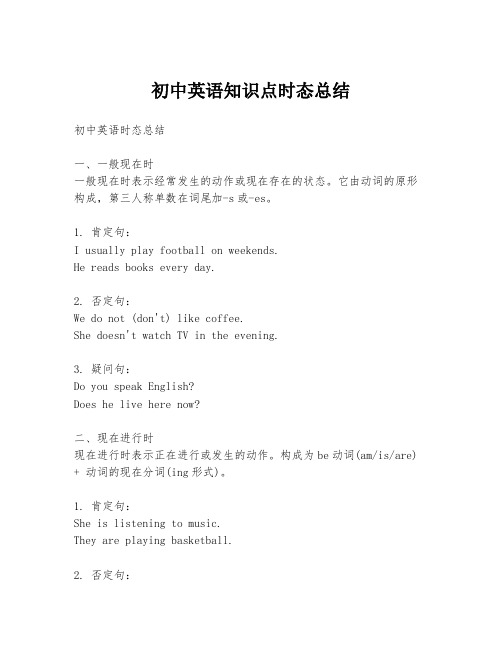
初中英语知识点时态总结初中英语时态总结一、一般现在时一般现在时表示经常发生的动作或现在存在的状态。
它由动词的原形构成,第三人称单数在词尾加-s或-es。
1. 肯定句:I usually play football on weekends.He reads books every day.2. 否定句:We do not (don't) like coffee.She doesn't watch TV in the evening.3. 疑问句:Do you speak English?Does he live here now?二、现在进行时现在进行时表示正在进行或发生的动作。
构成为be动词(am/is/are) + 动词的现在分词(ing形式)。
1. 肯定句:She is listening to music.They are playing basketball.2. 否定句:I am not (aren't) studying right now.The children are not (aren't) doing their homework.3. 疑问句:Is she cooking dinner?Are you waiting for someone?三、一般过去时一般过去时表示过去某个时间发生的动作或存在的状态。
规则动词在词尾加-ed,不规则动词则有特殊形式。
1. 肯定句:He walked to school yesterday.I visited my grandparents last week.2. 否定句:We did not (didn't) go to the cinema.She didn't buy anything at the store.3. 疑问句:Did you travel abroad last year?Did he finish his homework?四、过去进行时过去进行时表示过去某个时间点正在进行的动作。
初中英语八大时态总结归纳
初中英语八大时态总结归纳
初中英语八大时态
一般现在时:am/is/are + 动词原形
一般过去时:was/were + 动词的过去式
现在进行时:am/is/are + 动词的现在分词
过去进行时:was/were + 动词的现在分词
一般将来时:will + 动词原形
过去将来时:助动词would + 动词原形或was/were going to + 动词原形
现在完成时:助动词have/has + 动词的过去分词
过去完成时:助动词had + 动词的过去分词
一般现在时:every day,week,mouth,year,always,usually,often,sometimes,seldom 一般过去时:yesterday,the day,before,yesterday,just,now,ago,last week
现在进行时:now,these days,this week,all the time
过去进行时:at the day,then,this time yesterday,the hole morning
一般将来时:tomorrow,the day after tomorrow,next time,from now on,later (on),soon 过去将来时:the next day,the following week,soon,one day,in a week
现在完成时:already,yet,never,so far,since,before
1 / 11 / 1。
初中英语语法总结动词的六种时态
初中英语语法总结动词的六种时态动词有六种时态:一般现在时、一般过去时、一般将来时、现在进行时、过去进行时和将来进行时。
1. 一般现在时(Simple Present Tense):表示目前的状态、习惯、经常发生的事情或普遍真理。
-肯定句:主语+动词原形(第三人称单数形式加-s)- 否定句:主语+do(does)+not+动词原形- 疑问句:Do(Does)+主语+动词原形?2. 一般过去时(Simple Past Tense):表示过去发生的动作或状态。
-肯定句:主语+动词过去式- 否定句:主语+did+not+动词原形- 疑问句:Did+主语+动词原形?3. 一般将来时(Simple Future Tense):表示将来要发生的动作或情况。
- 肯定句:主语+will+动词原形- 否定句:主语+will+not+动词原形- 疑问句:Will+主语+动词原形?4. 现在进行时(Present Continuous Tense):表示当前正在进行的动作或情况。
- 肯定句:主语+am/is/are+动词-ing形式- 否定句:主语+am/is/are+not+动词-ing形式- 疑问句:Am/Is/Are+主语+动词-ing形式?5. 过去进行时(Past Continuous Tense):表示过去一些时间点正在进行的动作或情况。
- 肯定句:主语+was/were+动词-ing形式- 否定句:主语+was/were+not+动词-ing形式- 疑问句:Was/Were+主语+动词-ing形式?6. 将来进行时(Future Continuous Tense):表示将来一些时间点会继续进行的动作或情况。
- 肯定句:主语+will be+动词-ing形式- 否定句:主语+will not be+动词-ing形式- 疑问句:Will+主语+be+动词-ing形式?注意:动词的时态变化仅针对于一般动词,对于助动词、情态动词和不规则动词,变化规则可能会有所不同。
初中英语动词时态总复习(超级精华版)
2. 过去将来时的用法 : 1)表示从过去某时看将要发生的动作或存在的状态。常用于主句是一般过去时的宾语从句中。 例如:He said that he would finish his work before 9 o’clock. 他说他会在九点之前完成工作。 2)“was/were going to+动词原形”所表示的过去将来时,表示过去曾经打算或将要做某事。 例如:She said she was going to buy a car. 她说她打算买一辆小汽车。
01
02
1.改为一般疑问句并回答。
Yes, I will./No, I won't. I won't do my homework tonight.
I will do my homework tonight. Will you do your homework tonight?
2.改为否定句。
句型转换
表示在过去,经常或反复发生的动作。常与often,always等表示频度的副词连用。
01
例如:
02
When I was a child, I often played football in the street.
03
我是个孩子的时候,常在马路上踢足球。
04
例如:Did you see him today?
1.改为一般疑问句并回答。
01
句型转换
1.改为一般疑问句并回答。
2.改为否定句。
Jim does his homework every day. Does Jim do his homework every day?
Yes, he does./No, he doesn't. Jim doesn't do his homework every day.
初中英语 时态 整理 完全版
时态知识梳理动词的时态的知识框架。
一.一般现在时【考点1】一般现在时的用法一般现在时常用时间状语考点3】一般现在时的句式【注:be动词用法歌诀:】英语有个动词be,“面孔”不同要注意;我(I)用am; 你(you)用are, is连着他(he)/她(she)/它(it);主语单数用is,主语复数都用are;变疑问,将be往前提;变否定,be后加not;句首大写莫忘记,句末标点莫丢弃。
【考点4】动词三单变化规律动词第三人称单数变化的规则与可数名词复数变化的规则相同。
二,一般过去时【考点1】一般过去时的用法一般过去时常用时间状语【考点3】一般过去时之be动词1. be动词的过去式形式(表示过去存在的状态)2. be动词的句式变换【考点4】一般过去时之实义动词1. 实义动词的过去式形式规则动词的过去式不规则变化动词的过去式2. 实义动词的句式变换三,一般将来时【考点1】一般将来时的标志一般将来时常用时间状语1. will /shall +动词原形【注:在书面语中,主语是第一人称时,常用shall ,在口语中,所有人称都可以用will;且will 常简略为'll,如:I'll,he'll等】【注:be随着主语的变化有人称和数的变化】arrive, start等。
5. 其他表将来的结构【了解即可】【考点3】will和be going to 的异同点四,现在进行时【考点1】现在进行时的用法现在进行时的常用时间状语现在进行时由“系动词(am, is, are)+ 现在分词(动词加-ing形式)”构成。
【考点4】现在分词的构成【考点5】现在进行时的易错点五,现在完成时【考点1】现在完成时的结构【注:动词的过去分词构成规则】规则变化不规则变化(见附录部分)(需根据不规则变化表进行专门记忆)【考点2】现在完成时的用法和标志1) since+时间点时间副词:【注1:already; yet; just; ever; never; before的用法】【注2:since和for的用法】试比较,判断下列句子的正误。
